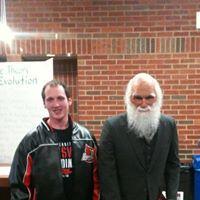-
Posts
128 -
Joined
-
Last visited
-
Days Won
1
Reputation Activity
-
 Microburritology got a reaction from MyCortisolLevelsRVeryHigh in Post Interview Acceptance Rates
Microburritology got a reaction from MyCortisolLevelsRVeryHigh in Post Interview Acceptance Rates
Umm it was a little more than 75% last year (my cycle), and we're planning on the same this year. My PI is actually on the ad-com this year, and she said literally all they look for if you've been called up for the interview is a) you are the same science-passionate student you seem on paper, and b) you aren't an arrogant douchebag.
All the best
-
 Microburritology reacted to blc073 in 2017 Biology Final Decision Threads!
Microburritology reacted to blc073 in 2017 Biology Final Decision Threads!
@biomednyc
I'm really happy for you! I think you will have a great graduate school career, and I know a lot of fantastic scientists at Penn.
As a Harvard student, I think it behooves me to make a few points: 1) We have over 800 faculty from which to choose, so you will find someone who fits your needs at Harvard, 2) I never feel isolated or like I'm just a number. The BBS office treats every student like it's a program with five students, 3) There is no evidence of high faculty turnover at Harvard. I asked about that when I was choosing a graduate program and I was given data that suggest nearly, if not every, junior faculty member at Harvard gets tenure. To corroborate, see this opinion piece. 4) You can, without doubt, get a place in many Boston cities/neighborhoods (e.g., Boston, Cambridge, Somerville, Dorchester, Revere, Medford, Allston, Mission Hill) by yourself on the Harvard stipend.
Again, this is not aimed toward you to make you feel like you made a bad decision. Simply liking one program over the other is sufficient to make a decision. However, it is important to keep the facts on record straight for future applicants and recruits. Harvard's reputation for being snobby or whatever comes from people perpetuating misinformation. When I told my undergraduate PI of four years that I got into Harvard, he spent thirty minutes trying to convince me to go elsewhere using misinformation like faculty are always leaving, the city is awful, they will look for any reason to kick out a student and save money. None of that is true.
Anyway, good luck at Penn! For real, I see a lot of good research coming from faculty in CAMB.
-
 Microburritology got a reaction from lizie.johnson in Post Interview Acceptance Rates
Microburritology got a reaction from lizie.johnson in Post Interview Acceptance Rates
Sure. One thing I would say is, definitely show that your interests are broad. Interact passionately with each interviewer, show them curiosity at the least even if you aren't interested in their field. I had a very smart (and very competitive on paper) peer with me on my recruitment weekend at Yale. She didn't make it, and I later found out from sources that she clearly expressed her enthusiasm in a very narrow subfield from the outset, which although great for her, didn't go down too well with the ad-com.
-
 Microburritology got a reaction from jmillar in Post Interview Acceptance Rates
Microburritology got a reaction from jmillar in Post Interview Acceptance Rates
Sure. One thing I would say is, definitely show that your interests are broad. Interact passionately with each interviewer, show them curiosity at the least even if you aren't interested in their field. I had a very smart (and very competitive on paper) peer with me on my recruitment weekend at Yale. She didn't make it, and I later found out from sources that she clearly expressed her enthusiasm in a very narrow subfield from the outset, which although great for her, didn't go down too well with the ad-com.
-
 Microburritology got a reaction from neuroslice in Post Interview Acceptance Rates
Microburritology got a reaction from neuroslice in Post Interview Acceptance Rates
Umm it was a little more than 75% last year (my cycle), and we're planning on the same this year. My PI is actually on the ad-com this year, and she said literally all they look for if you've been called up for the interview is a) you are the same science-passionate student you seem on paper, and b) you aren't an arrogant douchebag.
All the best
-
 Microburritology got a reaction from rockyMicrobe in Post Interview Acceptance Rates
Microburritology got a reaction from rockyMicrobe in Post Interview Acceptance Rates
Umm it was a little more than 75% last year (my cycle), and we're planning on the same this year. My PI is actually on the ad-com this year, and she said literally all they look for if you've been called up for the interview is a) you are the same science-passionate student you seem on paper, and b) you aren't an arrogant douchebag.
All the best
-
 Microburritology got a reaction from pitchfork in Post Interview Acceptance Rates
Microburritology got a reaction from pitchfork in Post Interview Acceptance Rates
Umm it was a little more than 75% last year (my cycle), and we're planning on the same this year. My PI is actually on the ad-com this year, and she said literally all they look for if you've been called up for the interview is a) you are the same science-passionate student you seem on paper, and b) you aren't an arrogant douchebag.
All the best
-
 Microburritology got a reaction from biomednyc in Post Interview Acceptance Rates
Microburritology got a reaction from biomednyc in Post Interview Acceptance Rates
Umm it was a little more than 75% last year (my cycle), and we're planning on the same this year. My PI is actually on the ad-com this year, and she said literally all they look for if you've been called up for the interview is a) you are the same science-passionate student you seem on paper, and b) you aren't an arrogant douchebag.
All the best
-
 Microburritology got a reaction from SysEvo in Post Interview Acceptance Rates
Microburritology got a reaction from SysEvo in Post Interview Acceptance Rates
Umm it was a little more than 75% last year (my cycle), and we're planning on the same this year. My PI is actually on the ad-com this year, and she said literally all they look for if you've been called up for the interview is a) you are the same science-passionate student you seem on paper, and b) you aren't an arrogant douchebag.
All the best
-
 Microburritology got a reaction from neur0cat in 2017 Applicant Profiles and Admissions Results
Microburritology got a reaction from neur0cat in 2017 Applicant Profiles and Admissions Results
Umm, NO.
Firstly, YMMV. That being said, I disagree with @Bioenchilada and @Superres on emailing PIs of interest at your prospective schools. Sure, you don't necessarily need to contact faculty in order to get an interview invitation, but you can, with the right email, get far more than just finding out "if they're taking students or not". I wrote extremely tailored, succinct emails to just 1-2 professors/program with whom I shared a very close research interest/fit (thanks to my work ex), and I got replies back with wordings like "I'll definitely keep a lookout for your application, would love to meet with you on xyz weekend".
In fact, I received interview invites from every program PIs of which I sent emails to, and didn't from where I didnt send emails to. Again, doesn't mean you necessarily need to contact faculty in order to get an interview invitation, but it really keeps you in the game if you're the kind of person with the research experience/background PIs looking for, and if your application were to be perceived unimpressive otherwise.
Totally agree with @bdnf_13.1 on the time writing such emails consumes - I would spend hours going over my email to bring it down to just 7-8 lines, to keep it really crisp and engaging enough to get a conversation going. I would strongly advise applicants to plan to put in a good amount of time and effort on this - it really pays off. I was, in fact, also guided by some on the 2016 forum to not do this, because "everyone else does it too" and "you wouldn't get much of a response". I couldn't be more thankful to god that I went ahead and did it anyway.
-
 Microburritology got a reaction from Gvh in 2017 Applicant Profiles and Admissions Results
Microburritology got a reaction from Gvh in 2017 Applicant Profiles and Admissions Results
Umm, NO.
Firstly, YMMV. That being said, I disagree with @Bioenchilada and @Superres on emailing PIs of interest at your prospective schools. Sure, you don't necessarily need to contact faculty in order to get an interview invitation, but you can, with the right email, get far more than just finding out "if they're taking students or not". I wrote extremely tailored, succinct emails to just 1-2 professors/program with whom I shared a very close research interest/fit (thanks to my work ex), and I got replies back with wordings like "I'll definitely keep a lookout for your application, would love to meet with you on xyz weekend".
In fact, I received interview invites from every program PIs of which I sent emails to, and didn't from where I didnt send emails to. Again, doesn't mean you necessarily need to contact faculty in order to get an interview invitation, but it really keeps you in the game if you're the kind of person with the research experience/background PIs looking for, and if your application were to be perceived unimpressive otherwise.
Totally agree with @bdnf_13.1 on the time writing such emails consumes - I would spend hours going over my email to bring it down to just 7-8 lines, to keep it really crisp and engaging enough to get a conversation going. I would strongly advise applicants to plan to put in a good amount of time and effort on this - it really pays off. I was, in fact, also guided by some on the 2016 forum to not do this, because "everyone else does it too" and "you wouldn't get much of a response". I couldn't be more thankful to god that I went ahead and did it anyway.
-
 Microburritology reacted to Bioenchilada in 2017 Applicant Profiles and Admissions Results
Microburritology reacted to Bioenchilada in 2017 Applicant Profiles and Admissions Results
Okay, I disagree with you in that this person needs to "stay away" from highly competitive programs. I think he has a pretty good shot if the rest of his profile is on par, which it definitely is.
-
 Microburritology got a reaction from PlanB in 2017 Applicant Profiles and Admissions Results
Microburritology got a reaction from PlanB in 2017 Applicant Profiles and Admissions Results
Haha, you conveniently ignored pretty much every other factor in determining an applicants selection likelihood to a program, except ranking and "Ivy League" status. Really?!
1) Applicant Profile: "regardless of your credentials?" LOL. You need to remember that all the adjectives you use for a program and its selection (extremely hard, more competitive, etc.) differ not just by the programs ranking, but also on your background/profile. Whats extremely hard for you might be different for someone else, when you take international students, and even more when you take south east asian students into the mix. Not only does Berkeley have A TON more of collaborations on life science projects/exchange programs with universities in India than Harvard, they also recognize more otherwise "unknown" universities. Further, If he's from the university I think he's from, he'd have a much better shot at Berkeley cuz not only has it taken students from that university, but it has made some major collaborations with it in the past. In such a scenario, just because Berkeley has a better biochem program than Harvard does not mean Berkeley would be tougher than Harvard for him, it would in fact be much easier.
2) Competitiveness: Saying that "UPenn's program is more competitive, and I believe more selective than UChicago" is very broad and vague. Please remember that you are a domestic applicant and he's an international applicant. Different pools, different competition levels, and again different perceptions especially when you're talking of private universities. He might be at the top of the international pool (he probably will with a high general GRE score) while someone domestic with the same stats might be in the average section of the domestic pool. I also personally believe UChicago is in fact far more selective than UPenn.
3) Rankings/Ivy League: I'm talking of graduate programs in the life science, and I'm sorry, but "Ivy League schools tend to have very strong and competitive programs in a wide range of fields" is actually misleading by way of vagueness. Every Ivy Leagues does have some strong programs, but in life sciences Darthmouth & Brown are nowhere in the top 20, and were not even my safety picks.
Even if you take the rankings into play, your argument is still flawed. According to US News Biological Sciences Graduate programs, UPenn is ranked 19 (same as UW Seattle), and UIUC 30th, both not in top 15. Berkeley is indeed tied with MIT, but is 4 spots below Harvard for biochem graduate programs. I know you're heading to UPenn, but WUSTL and UChicago are both far ahead of UPenn, even if you take your ranking argument into consideration. The only field where UPenn comes in top 10 is Immunology and Infectious Diseases programs at 6, thanks to Perelman School of Medicine.
-
 Microburritology reacted to juilletmercredi in Advice for a first year PhD student
Microburritology reacted to juilletmercredi in Advice for a first year PhD student
About your dog: I think that depends entirely on you and your program. I am in a social science program where the majority of my analysis and writing can be done from home, and I prefer to work from home or from a library (as opposed to my cube in the windowless cube farm). When I was taking classes I was generally there from 9-6 or so, but now that my coursework is finished I am rarely at the school itself. I go for meetings, seminars, interesting kinds of things and I do most of my work remotely. My time is verrry flexible, and if my building didn't prohibit it I would get a dog in a heartbeat. Another thing to keep in mind: a dog can be a great comfort when you're all stressed out over graduate school.
Advice?
Age:
-Don't feel like you have nothing to offer just because you are younger. I was 22 when I started graduate school. You got accepted to the program for a reason, and chances are you are just as equipped as any older students are to successfully complete the program, just in a different way.
-Your older classmates may be just as terrified as you. Talk to them. You have a lot in common. You are, after all, in the same place.
-You will feel like an imposter, like you don't belong, or like you are constantly behind. Or all three. It's normal. It will pass. (Well, sort of.) People of all ages go through this.
Adviser related:
-If you are lucky enough to get both research interest fit and personality fit perfect, congratulations! But sometimes, personality fit is more important than research interest fit as long as the research isn't too different. A great adviser is interested in your career development, likes you as a person, advocates for you, and wants to hear your ideas. Even if his or her research is quite different from yours, they may give you the autonomy to work on your own projects and just supervise you. A bad personality fit will drive you nuts, even if you love his or her research. Consider that when evaluating your adviser fit. (This will vary by field: research fit may be less important in the humanities, more important in the natural and physical sciences. Social sciences are somewhere in-between.)
-Don't be afraid to be straight up blunt with your adviser when it comes to asking about your progress. Ask if you are where you should be both academic program wise and getting-a-job-after-this-mess-wise.
-Be proactive. Advisers love when you draw up an agenda for your one-on-one meetings, come with talking points and progress to share, have concrete questions to ask, and have overall shown that you have been thoughtful and taken control of your own program. Of course, this won't immediately come easily to you, but in time you will work up to it. Every semester I type up my semester goals, and at the beginning of the year I type up annual goals. I show them to my adviser and we talk about whether they are too ambitious, or whether I need to revise them, and how I can meet them.
-Don't expect your adviser to actually know what courses you have to take to graduate. They will know about comprehensive exams and the dissertation, but a lot of professors don't really keep up with the course requirements, especially if their program is in flux. Get you a student handbook, and find out what you need to take. Map it out in a grid, and check off things when you finish them. Show this to your adviser every semester. You may have to explain how such and such class fills a requirement.
-Nobody loves you as much as you, except your mother. Keep this in mind as you take in advice from all sources, including your adviser. Your adviser is there to guide you, but that doesn't mean you have to do everything he says.
Studying:
-You will have to read more than you ever did before, in less time than you ever have before, and you will be expected to retain more than you ever have before. The way that you studied in undergrad may need some tweaking. Be prepared for this.
-Corollary: you may find that your methods change with age or interests or time. I preferred to study alone in college, but in grad school, I prefer to study in groups. It keeps me on task and the socialization keeps me motivated. You may find that you shift from being a more auditory learner to a visual learner or whatever.
-You will feel behind at first. This is normal.
-At some point you will realize that your professors don't actually expect you to read everything they assign you. This, of course, will vary by program, but there will be at least one class where the reading is actually impossible to do in one week. The point is to read enough that you know the major themes and can talk intelligently about them, and then pick some of the readings to really dig into and think more deeply about.
-For most programs, don't worry so much about grades. If you stay on top of your work and do what you're supposed to, you will probably get an A. How much grades matter varies from program to program. In some programs, a B is a signal that you are not up to par, and more than a few Bs will warrant a discussion with your adviser or the DGS. My program isn't like that - A, B, it's all meaningless. My adviser doesn't even know what my grades are. But at almost all programs, a C means you need to retake the course, and two Cs means you have to convince the DGS not to kick you out.
Extracurricular activity: What's that? No, seriously:
-A lot of your time will be unstructured. You will have coursework, but most grad classes meet once a week for two hours and you may have three classes. You may have meetings with your adviser every so often and some seminars or things to catch (like we have grand rounds and colloquia that are required), but a lot of time will be unstructured. However, since you have so much more work than you had in undergrad, you actually will have less free time than you had in undergrad. This may initially cause you great anxiety. It did for me. Some people love unstructured time, though. (I don't.)
-Because of this, you'll have to be planful about your non-grad school related stuff.
-TAKE TIME OFF. DO it. It's important for your mental health. However you do it doesn't matter. Some people work it like a 9-5 job. Some people take a day off per week (me) and maybe a few hours spread across the week. Some people work half days 7 days a week. However you do it, there needs to be a time when you say "f this, I'm going to the movies."
-Find your happy place, something that keeps you the you you were when you came in. I love working out. It gives me energy and I feel good. I stay healthy. I also love reading fiction, so sometimes I just curl up with a good book, work be damned. You have to give yourself permission to not think about work, at least for a couple of hours a week. You may also discover new hobbies! (I never worked out before I came to graduate school.)
-Your work will creep into all aspects of your life, if you let it. This is why I hate unstructured time. You will feel guilty for not doing something, because in graduate school, there is ALWAYS something you can do. ALWAYS. But since there will always be more work, there's no harm in putting it aside for tomorrow, as long as you don't have a deadline.
-You may need to reach outside of your cohort for a social life. None of my close friends are in my doctoral cohort. I've met master's students in my program, master's students in other programs, and I know a few non-graduate students I hang out with, too. Go to graduate student mixers. (If your university doesn't have any, organize some, if you like planning parties.) Join a student group that doesn't take up too much time. I had a doctoral acquaintance who kinda laughed at me because I joined some student groups other than the doctoral student one, and I was usually the only doctoral student in those groups, but I met some close friends (and future job contacts) and had a good time.
-DO NOT FEEL GUILTY FOR WANTING A LIFE OUTSIDE OF GRADUATE SCHOOL. This is paramount. This is important. You are a well-rounded, complex, multifaceted human being. NEVER feel bad for this. Everybody wants some kind of life outside of work. Yes, you may loooove your field, but that doesn't mean you want to do it all day long. Some other doctoral students, and perhaps professors, may make you feel bad about this. Don't let them. Just smile and nod. Then disappear when you need to.
Career:
-This is job preparation. Remember that from Day One. Always be looking for ways to enhance your skills. Read job ads and find out what's hot in your field, what's necessary, what's in demand. For example, in my field statistics and methods are a hot commodity, and they're not a passing fad. I happen to really like statistics and methods, so I have pursued that as a concentration of mine.
-Don't be afraid to take on volunteer work and part-time gigs that will give you skills that will be useful both inside academia and out, as long as it's not against your contract. Your adviser may be against it, but he doesn't have to know as long as it doesn't interfere with your work.
-If you want to work outside of academia - if you are even *considering* the possibility - please please definitely do the above. Even if you aren't considering it, consider the possibility that you won't get a tenure-track job out the box and that you may need to support yourself doing something else for a while. You will have to prove to employers that you have developed usable, useful skills and this is one of the easiest ways to do it. But don't overdo it - get the degree done.
-For more academic related ones - always look for opportunities to present and publish. Presentations look good on your CV. Publications look better. When you write seminar papers, wonder if you can publish them with some revision. Write your seminar papers on what you maybe think you may want to do your dissertation on. Even if you look at them three years later and think "these suck," you can at least glean some useful references and pieces from them. Discuss publication with your adviser early and often, and if you have the time and desire, seek out publication options with other professors and researchers. But if you commit to a project, COMMIT. You don't want to leave a bad impression.
-If you can afford it, occasionally go to conferences even if you aren't presenting. You can network, and you can hear some interesting talks, and you may think about new directions for your own research. You can also meet people who may tell you about jobs, money, opportunities, etc.
-Always try to get someone else to pay for conference travel before you come out of pocket. Including your adviser. Do not be shy about asking if he or she can pay. If he can't, he'll just say no. Usually the department has a travel fund for students, but often it's only if you are presenting.
-If you are interested in academia, you should get some teaching experience. There are two traditional ways to do this: TAing a course, and teaching as a sole instructor. If you can help it, I wouldn't recommend doing a sole instructor position until you are finished with coursework. Teaching takes a LOT of time to do right. You should definitely TA at least one course, and probably a few different ones. But don't overdo it, if you can help it, because again, it takes a LOT of time. More than you expect at the outset. If you are in the humanities, I think sole instructor positions are very important for nabbing jobs so when you are in the exam/ABD phase, you may want to try at least one. If your own university has none, look at adjuncting for nearby colleges, including community colleges. (I would wager that the majority of natural science/physical science students, and most social science students, have never sole taught a class before they get an assistant professor job. At least, it's not that common n my field, which straddles the social and natural sciences.)
-Always look for money. Money is awesome. If you can fund yourself you can do what you want, within reason. Your university will be thrilled, your adviser will be happy, and you can put it on your CV. It's win-win-win! Don't put yourself out of the running before anyone else has a chance to. Apply even if you think you won't get it or the odds are against you (they always are), as long as you are eligible. Apply often. Apply even if it's only $500. (That's conference travel!) Money begets money. The more awards you get, the more awards you will get. They will get bigger over time. If you are in the sciences and social sciences, you should get practice writing at least one grant. You don't have to write the whole thing, but at least get in on the process so that you can see how it's done. Grant-writing is very valuable both in and outside of graduate school.
-Revise your CV every so often. Then look and decide what you want to add to it. Then go get that thing, so you can add it.
-The career office at big universities is often not just for undergrads. I was surprised to learn that my career center offers help on CV organization and the academic job search, as well as alternative/non-academic career searches for doctoral students. In fact, there are two people whose sole purpose it is to help PhD students find nonacademic careers, and they both have PhDs. This will vary by university - some universities will have very little for grad students. Find out before you write the office off.
-It's never too early to go to seminars/workshops like "the academic job search inside and out", "creating the perfect CV," "getting the job," etc. NEVER. Often the leader will share tips that are more aimed towards early graduate students, or tidbits that are kind of too late for more advanced students to take care of. This will also help you keep a pulse on what's hot in your field. It'll help you know what lines you need to add to your CV. And they're interesting.
Other:
-Decide ahead of time what you are NOT willing to sacrifice on the altar of academia. Then stick to it.
I'm serious. If you decide that you do NOT want to sacrifice your relationship, don't. If it's your geographical mobility, don't. I mean, be realistic, and realize that there will always be trade-offs. But you have to think about what's important to you for your quality of life, and realize that there is always more to you than graduate school.
-If you don't want to be a professor, do not feel guilty about this. At all. Zero. However, you will have to do things differently than most doctoral students. Your adviser will probably never have worked outside of the academy (although this may vary depending on the field) so he may or may not be able to help you. But you have a special mission to seek out the kinds of experiences that will help you find a non-academic job. Test the waters with your adviser before you tell him this. My adviser was quite amenable to it, but that's because I told him that my goal was to still do research and policy work in my field just not at a university, AND because it's quite common in my field for doctoral students to do non-academic work. If you're in a field where it's not common (or where your professors refuse to believe it's common, or it's not supposed to be common)…well, you may be a little more on your own.
-Every so often, you will need to reflect on the reasons you came to graduate school. Sometimes, just sit and think quietly. Why are you doing this to yourself? Do you love your field? Do you need this degree to do what you want to do? Usually the answer is yes and yes, and usually you'll keep on trucking. But sometimes when the chips are down you will need to reevaluate why you put yourself through this in the first place.
-To my great dismay, depression is quite common in doctoral students. Graduate work can be isolating and stressful. Luckily your health insurance usually includes counseling sessions. TAKE THEM if you need them. Do not be ashamed. You may be surprised with who else is getting them. (I found out that everyone in my cohort, including me, was getting mental health counseling at a certain point.) Exercise can help, as can taking that mental health day once a week and just chilling. Don't be surprised if you get the blues…
-…but be self-aware and able to recognize when the depression is clouding your ability to function. Doctoral programs have a 50% attrition rate, and this is rarely because that 50% is less intelligent than, less motivated than, less driven than, or less ambitious than the other 50% that stays. Often they realize that they are ridiculously unhappy in the field, or that they don't need the degree anymore, or that they'd rather focus on other things in life, or their interests have changed. All of this is okay!
-You will, at some point, be like "eff this, I'm leaving." I think almost every doctoral student has thought about dropping out and just kicking this all to the curb. You need to listen to yourself, and find out whether it is idle thought (nothing to worry about, very normal) or whether you are truly unhappy to the point that you need to leave. Counseling can help you figure this out.
-Don't be afraid to take a semester or a year off if you need to. That's what leaves of absence are for.
Lastly, and positively…
…graduate school is great! Seriously, when else will you ever have the time to study what you want for hours on end, talk to just as interested others about it, and live in an intellectual community of scholars and intellectuals? And occasionally wake up at 11 am and go to the bank at 2 pm? Sometimes you will want to pull out all of your hair but most of the time, you will feel fulfilled and wonderfully encouraged and edified. So enjoy this time!
-
 Microburritology reacted to fuzzylogician in Full Ride School or More Reputable School?
Microburritology reacted to fuzzylogician in Full Ride School or More Reputable School?
Asking the same question in a different forum isn't going to lead to different outcomes. To reply, click here:
-
 Microburritology reacted to Infinito in 2016 Applicant Profiles and Admissions Results
Microburritology reacted to Infinito in 2016 Applicant Profiles and Admissions Results
That feeling when one of your previous top choices that waitlisted you now hits you up for a spot. And you're like "If you didn't pick me as a top choice candidate then, what makes you think I'd pick you now?" Cuz you've already made your choice~
-
 Microburritology got a reaction from HopefulPHD14 in 2016 Applicant Profiles and Admissions Results
Microburritology got a reaction from HopefulPHD14 in 2016 Applicant Profiles and Admissions Results
Declining Penn Bio, WUSTL DBBS, and Oxford IBS. Hope it helps someone on the waitlist!
-
 Microburritology got a reaction from laxgoal100 in 2016 Applicant Profiles and Admissions Results
Microburritology got a reaction from laxgoal100 in 2016 Applicant Profiles and Admissions Results
Declining Penn Bio, WUSTL DBBS, and Oxford IBS. Hope it helps someone on the waitlist!
-
 Microburritology got a reaction from Bioenchilada in 2016 Applicant Profiles and Admissions Results
Microburritology got a reaction from Bioenchilada in 2016 Applicant Profiles and Admissions Results
Declining Penn Bio, WUSTL DBBS, and Oxford IBS. Hope it helps someone on the waitlist!
-
 Microburritology reacted to biosci in 2016 Applicant Profiles and Admissions Results
Microburritology reacted to biosci in 2016 Applicant Profiles and Admissions Results
In one of life's great ironies I got the award writing as if I was going to a school I got rejected from
-
 Microburritology reacted to immuno91 in 2017 Applicant Profiles and Admissions Results
Microburritology reacted to immuno91 in 2017 Applicant Profiles and Admissions Results
In what may be a surprise to nobody, I'm going to disagree with those preaching about GPA. About myself: I graduated from a liberal arts school with a 3.5 GPA and a 3.4 BCMP GPA. Admittedly, I had 2.5 years of full-time research experience by the time I applied. Counterpoint: my undergraduate research experience consisted of a nine month thesis project. My GRE was a 163/163 for those curious about that.
Now, having had the opportunity to work (and have candid conversations) with a faculty member on the Harvard BBS admissions committee, I'll say my piece. GPA and GRE matter in the screening process. But they don't have to be amazing. The general rule that I've heard for screening applicants is a GPA above 3.5 or 160+/160+ on the GRE. One is forgivable, but missing both won't do. Fortunately, one of these can be rectified somewhat easier than the other (GRE scores are easy to move, GPA not so much). Should people with lower GPAs apply more broadly? Yes. But let's stop saying that GPA is a be all, end all here. It's not. Maybe for some of the less lab oriented sciences (stats, biostats, bioinformatics), GPA is much more important. But for lab-based sciences, programs that are ultimately bench focused, there's a reason that you see a reasonable number of people getting into top tier programs with 3.5 GPAs while a lot of people with 3.8 GPAs or whatever are getting rejected pre-interview. That being said, there are likely some programs that value GPA more than others. The best way, in my opinion, to assess this is to see what the program says about GPA on its website. If the program is showcasing high mean/median GPAs for interviewees/accepted students, then they probably care more about GPA than your average program. If the program, however, is just reporting a range (Stanford Biosciences: 2.88-4.00) or doesn't say much (Harvard DMS: "There is no minimum GPA..."), then they're probably looking at other things a little more closely.
Moving on to other parts of your application, the most consistent piece of advice that I've received is that your letters are by far the most important part of the package. This is the reason why it is critical to have faculty members (if the work was done in an academic setting) or senior supervisors (ideally with a doctoral degree in a non-academic setting) write them. The commentary I've heard is that it's the letters that will make or break getting invited to an interview (hence why it's important to have people that know your work write the letters - what does this mean if your PI doesn't know you that well? Maybe see if a post-doc that does know you well can prepare a draft for your PI to edit/sign). Some of the comments in this thread have been focused on getting people to improve their package. Advising people to find the best letter writers (non-postdoc letter writers) is probably some of the best advice that can be given. It's certainly better than the GPA commentary.
Research experience is probably the other most important factor. There are a fair number of programs that place a premium on having post-bacc research experience - and I think every faculty member knows that working full time in a lab for a year is much different than working full time in the summer/part time during the school year. However, I think a lot of people underestimate the importance of your resume/CV in the process. That is your opportunity to convince the admissions committee that 1) you have significant experience, 2) you can articulate it briefly, and (program dependent) 3) that you have other interests besides science (because guess what - these programs want good scientists, but they also want to foster a great community within the program; half of my interviews spent more time discussing my experience as a college athlete than my research experience). I know that my PI edited my CV 3 or 4 times before I was ready to submit it. Also, it's worth tailoring your CV to certain programs. I applied to programs at JHSPH and UW that were based in schools of public health - as such, I put more emphasis on my experience working abroad on public health related projects in the CVs that I sent to those schools.
Of course, all this being said, if you can't remedy the deficiencies in your application by the time to apply (your GRE isn't 160/160, that third letter hasn't really fallen into place), then it may be time to reevaluate your chances at some of the higher ranked programs. And certainly, in the meantime, you should look at other programs that may not be as highly ranked (though I'm curious as to when BU, Sinai, and UMiami became top tier - they're good, but let's not get carried away). But absolutely don't discount higher ranked programs because of GPA. This is probably the most holistic admissions process you'll ever encounter. That is something to be taken advantage of.
-
 Microburritology reacted to adiJ in Why So Few Johns Hopkins Signatures?
Microburritology reacted to adiJ in Why So Few Johns Hopkins Signatures?
For me, I visited the area a few years back and thought it was a dealbreaker. An important aspect of doing a PhD is that you must remember you are staying there for 5+ years.
If you are interested in the science being done there you should definitely apply. You can think about this after you had a formal visit for your interviews, but JHU is definitely a top school, no one's going to deny that.
-
 Microburritology got a reaction from biotechie in 2016 Applicant Profiles and Admissions Results
Microburritology got a reaction from biotechie in 2016 Applicant Profiles and Admissions Results
Agree with @Bioenchilada. I actually talked about my status (interviews, acceptances, etc.) in all my interviews - and one of them jokingly said, "well we oughta grab you from them then". So yeah it depends, but in my case, definitely worked in my favor.
-
 Microburritology got a reaction from stygldbby in 2016 Applicant Profiles and Admissions Results
Microburritology got a reaction from stygldbby in 2016 Applicant Profiles and Admissions Results
OMG I JUST GOT ACCEPTED TO THE YALE BBS MCGD program . And that, ladies and gentlemen, officially marks the end of Fall 2016 admissions cycle for me.
Feels surreal to have 4/4 acceptances from my interviews, and to have an offer from Yale (which seemed like a remote possibility 5 years ago). Also feel pretty accomplished having balanced a hectic work life with the entire admissions cycle, right from studying late nights for the GRE to attending the interviews, especially with limited paid time off.
So yup, heading to New Haven, CT. All the best to all you guys waiting on decisions. 'Twas a fun ride.
-
 Microburritology reacted to aufish92 in 2016 Applicant Profiles and Admissions Results
Microburritology reacted to aufish92 in 2016 Applicant Profiles and Admissions Results
Well it's official, I am going to MIT in the fall! I was really going back and forth between MIT and Wisconsin MDTP, but overall decided MIT was the one. Anybody else on here going to MIT microbiology??









